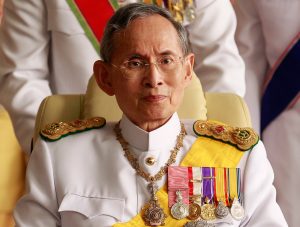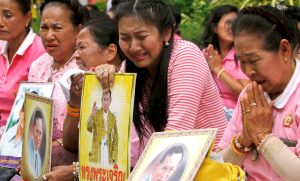King Bhumibol Adulyadej
By Anna Naran, Foster Undergraduate who participated in an exchange with Chulalongkorn University in Bangkok, Thailand.
The first couple of times I drove around Bangkok I was instantly captivated by the photos of the King and Queen that seemed to line numerous sky scrapers, buildings, and billboards. It was as if I stepped out of reality and entered into a realm that was reminiscent of the Hunger Games. I almost found it comical. Could President Obama’s face line the buildings of Downtown LA, Chicago, or even New York City without being vandalized, looked down upon, or criticized? Doubt it. However, two and a half months into living here, these photos no longer phased me. Then October 13th happened.
 On October 13, 2016, as I was living it up in Bali, Indonesia with a few of my friends, we were notified that the King of Thailand, Bhumibol Adulyadej, died. To be honest, his death did not really spark anything within us other than the normal feelings you feel when someone you were kind of aware of—a celebrity, political figure, etc—dies. Hours passed and as we continued to bask in the beauty and sunlight that Bali offered, the death of the King snuck into the back’s of our minds. It was not until our Chulalongkorn Exchange Facebook page began lighting up our phones with notifications that we fully began to understand the severity of his passing. Dark colors, must be worn for a year. Alcohol, banned for a month. Bars and clubs, closed. Would this happen if President Obama were to pass? Heck, people don’t even mourn this way when their own parents pass. We spent the rest of our time in Bali, googling who this King really was.
On October 13, 2016, as I was living it up in Bali, Indonesia with a few of my friends, we were notified that the King of Thailand, Bhumibol Adulyadej, died. To be honest, his death did not really spark anything within us other than the normal feelings you feel when someone you were kind of aware of—a celebrity, political figure, etc—dies. Hours passed and as we continued to bask in the beauty and sunlight that Bali offered, the death of the King snuck into the back’s of our minds. It was not until our Chulalongkorn Exchange Facebook page began lighting up our phones with notifications that we fully began to understand the severity of his passing. Dark colors, must be worn for a year. Alcohol, banned for a month. Bars and clubs, closed. Would this happen if President Obama were to pass? Heck, people don’t even mourn this way when their own parents pass. We spent the rest of our time in Bali, googling who this King really was.
When we landed in Bangkok, all seemed fine. It had been a few days since the King’s passing and life did not seem any different than before. However, the next day when I headed to the subway station to make my way to class, pictures of the King, pictures that I had once found so comical, pictures that no longer sparked my interest, became intriguing again. As I stood on the subway, a sea of blackness came over me. The dark colors and the somber faces showed me that this King was truly something else. They call Thailand the Land of Smiles and from what I could see this King was the reason these people ever smiled. Without him they were left with nothing.
It was hard for me to wrap my head around how an entire country could love unconditionally and honor someone wholeheartedly. I found this so hard to fathom because I spent so much of my time comparing Thailand to America. But that’s where ignorance begins. When we think that our home land is laced with the truth and that everything that differs is merely wrong, odd, or even comical, we begin to enter a land of foolishness.
King Bhumibol Adulyadej ruled for 70 years, making him the world’s longest-serving head of state. He did not live a luxurious life, as most would assume when someone carries a title as powerful as ‘King’. He spent the majority of his reign working on ways to improve the lives of the poorest living in Thailand, which included providing medical care in the most rural of areas and creating tools and techniques to catalyze development in poverty stricken areas. He promoted peace and encouraged responsible economic consumption.
 It is immensely vulnerable to love someone unequivocally. The love that the Thai’s had and will always have for King Bhumibol Adulyadej, their commitment to him, and their ability to begin smiling, slowly but surely, in the face of such sorrow has taught me more than I could ever have imagined. Placing your faith in someone or something should never be looked down upon, rather it should be something that is respected and cherished. We choose to study abroad for a multitude of reasons. I chose to study abroad to gain new perspectives. I am forever grateful that King Bhumibol Adulyadej guided me toward a perspective that aims to accept and understand rather than to compare and judge. Long live the King and long live the smiles he elicited on Thailand.
It is immensely vulnerable to love someone unequivocally. The love that the Thai’s had and will always have for King Bhumibol Adulyadej, their commitment to him, and their ability to begin smiling, slowly but surely, in the face of such sorrow has taught me more than I could ever have imagined. Placing your faith in someone or something should never be looked down upon, rather it should be something that is respected and cherished. We choose to study abroad for a multitude of reasons. I chose to study abroad to gain new perspectives. I am forever grateful that King Bhumibol Adulyadej guided me toward a perspective that aims to accept and understand rather than to compare and judge. Long live the King and long live the smiles he elicited on Thailand.
